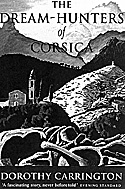 Author: Dorothy Carrington
Author: Dorothy Carrington
Pages: 206
Illustrations: None
Maps: One
Footnotes: 205, presented by chapter at the end of the book
Appendices: None
Bibliography: 128 sources noted
Index: 214 entries
Publisher: Weidenfeld and Nicolson, London, reprinted in the USA by Trafalgar Square Publishers, P. O. Box 257, North Pomfret, VT 05053, phone (800) 423-4525
Publication Date: 1995 (1997 in the US)
Binding: Cloth (hardbound)
ISBN: 0-297-81260-2
Price: $29.95
Summary: To understand Napoleon one should understand Corsican society of the 18th Century in which he was reared, what he accepted of it and what he rejected. To understand Corsican society of that time one must read Dorothy Carrington's three distinguished books: Granite Island: A Portrait of Corsica (1971); Napoleon and His Parents: On the Threshold of History (1988); and now her The Dream-Hunters of Corsica (1995), a magical description of the occult in Corsican life.
Through its history Corsica has been a rock, jutting upward out of the Tyrrhenian Sea, swept over by waves of conquerors -- the Etruscans, ancient Greeks, Romans, Vandals, Saracens, Aragonese, Pisans, Genoese, and French. Some of these waves, not all, left upon receding a deposit of customs and institutions that endured. The Romans, for example, left their Latin language, which became the Corsican dialect, a Romance tongue like Italian, French, and Rumanian. The latterday Romans and succeeding medieval occupants also left Christianity and its organization and liturgy in the Catholic Church.
But deeper than these, deep within the Corsican psyche, have been the occult beliefs stemming from Paleolithic and Neolithic days, the Stone Age cultures, before the invention of writing. Oldest, and perhaps deepest, was the belief in Destiny, a "some thing" that is stronger than the gods, stronger even than God. It programs a person's life even before he or she is born. Dating from pre-Neolithic times, when Corsicans were still a hunting and food-gathering people, the belief was reinforced by the nature of their lives and of their history, as they struggled to wrest a living from rugged, mountainous terrain and as they always resisted invaders only in the end to be always defeated. The belief was a form of fatalism that encouraged boldness, even recklessness, in initiative and endurance in adversity.
Nearly as old, its origins lost in the mists of time, was a complex of beliefs, persons, and practices associated with the Corsican cult of the dead: notably, the mazzeri, the signadori, and the vendetta. The mazzeri were and still are "dream hunters who can foresee death". At night,"responding to an inexorable call, they go hunting -- or dream they do -- and kill an animal in the face of which they recognize the face of a living person". Once pinpointed by the dream hunter, "that person will soon die". The mazzeri do not cause death: they only announce its imminence.
The signadori, on the other hand, are healers who in daytime perform incantations to dispel the influence of the Evil Eye that is causing sickness and emotional distress. The vendetta of blood feud -- the back-and-forth killing between two families whose honor had been originally impaired -- "was a spectacular expression of the cult of the dead." The motive to kill a murderer "was not self-protection but to appease the victim; otherwise his spirit might return to wreak vengeance on his defaulting kinsman by dragging him down to his own shadowy realm".
These beliefs and practices were strong in the 18th Century. They were still strong in 1948, when Dorothy Carrington first arrived in Corsica and began her observations before modern technology and tourism had begun to bulldoze their destruction. She describes them with an intuitive grace and sensitivity that recovers their magical ambience. However, as it its not her subject, she largely neglects the relation of Napoleon to the Corsican occult. When I wrote asking her what was the relationship, she responded with the article in this issue of Napoleon.
More book reviews:
Back to Table of Contents -- Napoleon #9
Back to Napoleon List of Issues
Back to MagWeb Master Magazine List
© Copyright 1997 by Emperor's Press.
This article appears in MagWeb (Magazine Web) on the Internet World Wide Web.
The full text and graphics from other military history magazines and gaming magazines are available at http://www.magweb.com